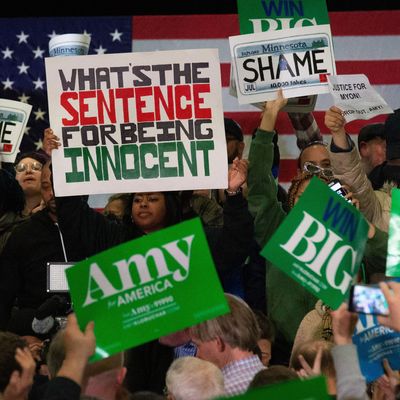
Amy Klobuchar finished with zero percent of the black vote in Saturday’s South Carolina primary. But things weren’t all doom and gloom ahead of Super Tuesday: Her campaign-trail nemesis, Pete Buttigieg, had dropped out of the race after a similarly dismal showing in the Palmetto State, giving the senator an opening to recruit some of his newly unmoored supporters. The crucial test would be her home state of Minnesota, one of 15 that vote this week; anything short of a first-place finish there seemed likely to torpedo her 2020 bid. On Sunday, Klobuchar prepped for a rally in St. Louis Park hoping for a show of strength. What she got instead was a protest that forced her to cancel the event and may have been a watershed moment in her decision to drop out.
The night before Klobuchar announced the suspension of her campaign and endorsement of Joe Biden on Monday, demonstrators with the Minneapolis NAACP and Black Lives Matter Twin Cities commandeered a rally stage that had been set up for her, according to the Minneapolis Star Tribune. They carried signs and banners and chanted “Free Myon” and “Klobuchar has got to go,” prompting counter-chants of “Amy!” from among the hundreds gathered to support her. Myon Burrell was a 16-year-old black boy for whom Klobuchar’s office secured a lifetime prison sentence in 2002, when she was the district attorney for Hennepin County. Burrell was convicted of murder after a shooting that November killed an 11-year-old bystander; holes in the case abound, as outlined by a recent Associated Press report. The details include that Burrell’s alleged accomplices denied he was even there. A substantial share of the state’s witnesses were paid jailhouse informants. The main eyewitness claimed to have seen Burrell that night across the street from where the shooting took place — in the dark, 25 feet away, and behind a wall. The indignities only worsened after the teen was convicted: Klobuchar denied Burrell’s request to attend a memorial service for his mother, who died in a car collision on the way home from visiting him in prison one day.
The case has since become a rallying cry for local activists. The groups protesting on Sunday had called on Klobuchar previously to suspend her campaign, citing her handling of the Burrell case. For her part, the senator has made tepid suggestions that its verdict be reviewed if any new evidence has come to light. But Sunday’s activists were adamant. “Amy Klobuchar has the power and the influence — if she wanted to actually help us to free him she could, and she doesn’t want to,” Leslie Redmond, president of the Minneapolis NAACP, told USA Today. Indeed, the demonstrators asked Klobuchar to have Burrell’s family join her onstage on Sunday. The campaign declined and canceled the event instead, saying they had offered to meet with protesters in private but balked at what they called last-minute changes to the terms of the parley.
Whether the resulting press prompted her withdrawal is yet to be seen. But for a candidate whose polling numbers with black voters seemed to have nowhere to go but up, the prospect of a backslide affirmed Klobuchar as the inheritor of unwanted mantles once held by two bygone contenders: Buttigieg and Kamala Harris. Like Klobuchar, Harris’s record as a prosecutor made her a target of ire among black leftists and organizers, whose antipathy toward officials who’ve built their careers feeding America’s prisons has gained more popular purchase of late. And like Buttigieg, the senator seemed uniquely unable to sell black voters on her candidacy — though contrary to widespread narratives hammering Mayor Pete for his ineptitude on this front, Klobuchar has consistently polled worse than he did. With Bernie Sanders poised within striking distance in Minnesota, what was already a must-win contest assumed the weight of a referendum on Klobuchar’s racial-justice record. If Buttigieg’s poor showing with black South Carolinians sounded the death knell for his campaign, a similar showing in Klobuchar’s home state would’ve been fatal for a candidacy whose rationale for existing was its ability to build winning coalitions.
Klobuchar beat the potential fallout from Sunday’s protest to the punch — which is especially ironic given the Burrell case’s prominence in the senator’s campaign lore. In her 2007 U.S. Senate bid as well as her recent debate appearances, she’s invoked it as an example of her commitment to keeping black communities safe. Actual black people, in significant numbers, seem either to have viewed it differently or been too busy supporting other candidates to dwell on it. Evidence is sparse that this means a wider reconsideration is taking place around whether aggressive law enforcement is the best solution to crime in the communities Klobuchar claimed to be protecting. But while the primacy of black civil-rights protest interrupting Democratic rallies in 2020 is a shadow of its 2016 self, the timing this weekend was fortuitous. Klobuchar’s struggles with black voters — with whom she was polling at less than 0.5 percent nationally in January — reached a fever pitch precisely when she needed their backing most. If that’s not a fitting coda to her campaign, I don’t know what is.






























